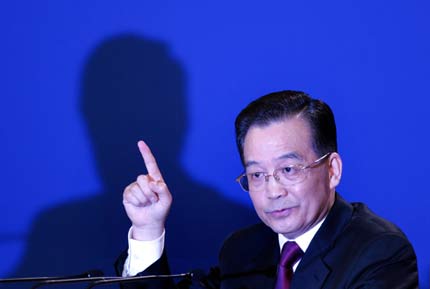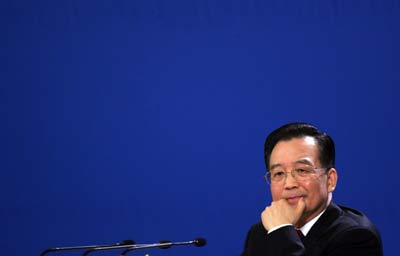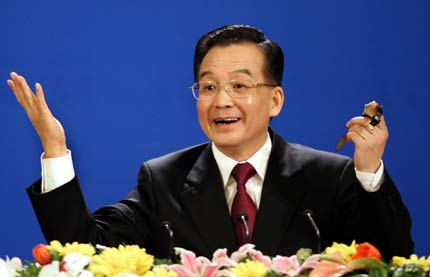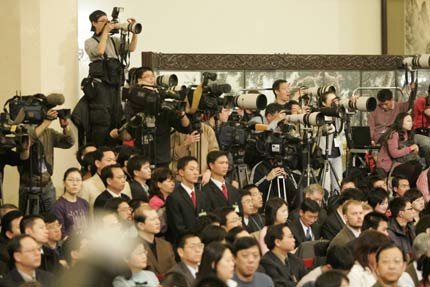Chinese Premier Wen Jiabao gave a stern warning to Chen Shui-bian concerning the Taiwan leader's secessionist activities. Wen says Beijing is paying close attention to the situation in the island and is prepared to take action if necessary.
Wen said if Chen were to give up his pursuit for Taiwan independence, Beijing would be ready to engage in political talk with any party, including Taiwan's ruling Democratic Progress Party.

Chinese Premier Wen Jiabao answers a question during a press conference after the conclusion of the annual session of the National People's Congress in Beijing, March 14, 2006. The annual meeting of the nation's top lawmaking body closed Tuesday at the Great Hall of the People. [Xinhua] |
Wen made the remarks at a press conference held in the Great Hall of People in downtown Beijing after the Fourth Annual Session of the Tenth National People's Congress(NPC) ended.
"The negotiations will be held on an equal footing, and there is no question as one side will swallow up the other one," Wen said.
"No matter what party affiliations they may have, no matter who they are, what they said or did in the past, so long as they are committed to the one-China principle, we are ready to have dialogues and negotiations with them, even including those from the Democratic Progressive Party in Taiwan," Wen said.
Chen scrapped a policy-making council on reunification with the mainland in late February.
Wen said Chen's move to scrap the reunification council and reunification guidelines was "risky, dangerous and deceptive", against the will of people, and endangered peace and stability in the area. Wen said Chen, in the end, will lose popular support from his constituency because of his secessionist activities.
"It's a grave affront to the one-China policy," Wen said.
He said the Taiwanese leader is making trouble that is affecting both the island and the cross-Strait ties. Wen believes Chen is trying to restrict and block cross-Strait exchanges, which may harm Taiwan's interests.
Wen said China will never tolerate the secession of Taiwan from the motherland, and will do its best to seek for peaceful reunification.
** Pledge to Continue Reform
Chinese Premier Wen Jiabao pledged that China will continue to implement its reform and opening-up policy, and endeavor to build the country into a well-off state with its own characteristics.
"China has no way out by retreating (from reform), but to go forward" in facing different and amounting difficulties or setbacks, Wen said, before he fed questions from foreign and Chinese journalists at the Great Hall of the People in Beijing Tuesday morning.

Chinese Premier Wen Jiabao listens to a question during a news conference after the closing session of National People's Congress at the Great Hall of the People in China's capital Beijing March 14, 2006. Wen pledged on Tuesday to press that China will continue to implement its reform and opening-up policy, and endeavor to build the country into a well-off state with its own characteristics. [Reuters]
| The annual 10-day session of the lawmaking body, the National People's Congress, concluded in Beijing Tuesday, with the legislators approving the Eleventh Five-Year development plan for China from 2006-2010 by an overwhelming majority. The plan highlights a government investment shift from better developed urban areas to poorer rural regions in the coming years.
The Chinese premier said it is a tradition that the country and its people, while staying in stable social environment and on its ascent, are good at thinking of the uncertainties, potential risks and hidden problems.
Wen said that he and his administration are thankful of the people's popular support, and what "saddened him most" in the past three years as China's premier is that the government could have done better to solve some of people's concerns, especially about medical care, education, housing and work safety.
** New Countryside
Wen stressed the importance of building new socialist countryside in the coming years to sustain a rapid economic growth in the future.

Chinese Premier Wen Jiabao holds his watch as he extends his news conference for two more questions after the National People's Congress at the Great Hall of the People in China's capital Beijing March 14, 2006. The annual meeting of the nation's top lawmaking body closed Tuesday at the Great Hall of the People. [Reuters] |
"The issues concerning agriculture, rural areas and farmers are fundamental ones bearing on the overall China's modernization drive," Wen said. Building the new socialist countryside refers to putting agriculture and rural areas "more prominently on the agenda of China's modernization drive."
Apart from completely rescinding agricultural taxes, China plans to earmark nearly 340 billion yuan (US$43 billion) for agriculture, rural areas and farmers in 2006, 42.2 billion yuan more over last year, according to Wen's work report at this year's NPC session.
In building new socialist countryside, democratic rights of farmers should be safeguarded, especially their rights on land production and management, Wen said.
China's governemnt must render harsh punishment to those who illicitly seize land from the farmers, Wen said.
** Japanese leaders responsible for stalled bilateral ties
In response to a question on China-Japan relations, the premier admitted that bilateral ties between the two countries has been running up with difficulties.
It will be very difficult for the Sino-Japanese relations to make progress if the issue of Japanese leaders' visits to a shrine worshipping war criminals can not be well resolved, Wen said.
It is not the Chinese nor the Japanese people, but the leaders of Japan, to blame for the souring Sino-Japanese ties, Wen said at the press conference.
The premier stressed that the China-Japan relations could "hardly develop in a smooth manner" unless the issue of Japanese leaders' visits to Yasukuni Shrine worshipping class-A WWII war criminals can be well addressed.
It is China's unswerving effort to develop friendly Sino-Japanese relations from generation to generation, Wen said.
The development of the Sino-Japanese relations should follow the spirit and principle of "taking history as a mirror and looking forward to the future" and the three political documents.
Wen called for the two countries to continue strategic dialogue between the governments so as to remove obstacles affecting the bilateral relations.
"We should also strengthen people-to-people exchanges and enhance mutual understanding and trust," Wen said.

Foreign and domestic journalists attend Premier Wen Jiabao's press conference after the conclusion of the annual session of the National People's Congress in Beijing, March 14, 2006. The annual meeting of the nation's top lawmaking body closed Tuesday at the Great Hall of the People. [Xinhua] |
Wen also urged to stabilize and develop Sino-Japanese trade and economic ties, in a bid to expanding "mutual beneficial cooperation for win-win results."
Premier Wen's press conference was telecast live in the Great Hall of the People in Beijing on Tuesday morning.
** Heavy polluters face punishment
China failed to meet the environmental objective in the 10th five-year plan while most of the objectives have been achieved, premier Wen revealed, adding that environmental pollution has become a big problem for the country's development.
The premier urged stricter law enforcement, which is the most important and difficult thing in environmental protection.
He demanded authorities at all levels to close down the enterprises causing serious pollution and consumption of large amount of energy.
The polluting enterprises and individuals that have caused major losses to the people and the society should be held liable, according to Wen.
** Harsh punishment for illicit land seizure
China will mete out harsh punishment to those who illicitly seize land from the farmers, said Chinese Premier Wen Jiabao.
"The core issue concerning Chinese farmers is the land issue, " he said. "We must give adequate and due compensation to farmers whose land are seized. The land transfer revenue should mainly be paid to farmers."
Wen said China must adopt the strictest arable-land protection system and must protect farmers' right to independent farming on their contracted land.
China's reforms started from the countrysides and the most important policy adopted is the household responsibility system. According to the system, the land belongs to the collective entity in villages, while the right to production and farming belongs to farmers.
Wen said the system is a major feature as well as a major advantage in Chinese countryside. China will guarantee the long-term right to independent farming for the farmers. "This guarantee will remain unchanged for fifteen years, for thirty years, or even forever."
** China pursues self-defense policy
China pursues a national defense policy of self-defense, and its limited increase of military expenditure is mainly used to improve the living conditions of officers and to improve self-defense capability, said Chinese Premier Wen Jiabao.
The country's defense policy is transparent, said Wen, adding that China has never dispatched even one soldier abroad except its peacekeepers, and has not occupied an inch of foreign land.
** Management of Internet conforms to world practice
The Chinese government supports the development of Internet and the management of the Internet conforms to international common practice, said Premier Wen.
Being the people's government, it should subject to the democratic supervision from the masses, and listen to the various opinions on the Internet, said Wen.
He noted that the Internet is developing rapidly in China. Up to now, the number of netizens has exceeded 100 million. The Chinese government supports the development and wide application of the Internet.
Only when supervised by people, will the government not be slack in its work; only when every one bears his/her responsibility, will every cause of the country develop smoothly, Wen said.
China's Constitution stipulates that every citizen has the right and freedom of using the Internet, at the same time every citizen should consciously abide by the laws and regulations and safeguard national and social interests, the premier said.
China's management of the Internet is strictly based on law. In the meantime, China calls for self-discipline and self-management of the Internet industry, Wen said.
"Websites should convey correct information, rather than misleading people and bringing negative impact on the social order," he added.
"No more surprise currency appreciation"
Chinese Premier Wen Jiabao on Tuesday ruled out possibility for another one-off adjustment of its currency, the yuan, such as last July's 2.1 percent revaluation against the dollar, and said China will allow the yuan to move more flexibly.
"According to the current regime, there is room for the yuan to fluctuate either up or down on its own in line with changes in the market. It's no longer necessary for us to take one-off administrative measures," he said.
The yuan has risen just 0.8 percent since it was revalued by 2.1 percent last July. Before the July 2005 move, the yuan traded at about 8.28 to the dollar. The revaluation took it to 8.11 and it now trades at about 8.05.
"There will be no more surprises," Wen said.
Wen noted that the yuan, also known as the renminbi (RMB), had risen against the dollar even though the US currency itself has been strong. And its gains against the euro and the yen had been even greater.
"Through this reform we have established a new RMB exchange rate regime. We will further strengthen the exchange rate system and we will expand the foreign exchange market and allow more flexibility in the fluctuation of the Chinese currency," he said.
Moreover, in response to a question on China's bank reform, Wen told the press that the nation will continue to hold a majority of stake in the state-owned commercial banks to guard against financial risks as China pushes forward the reform aimed at improving the banks' management level and economic gains. |





